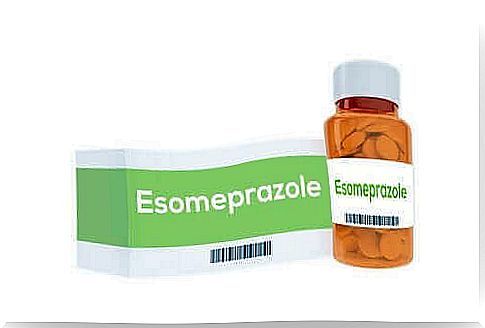The Uses And Effects Of Esomeprazole

In this article we tell you everything you need to know about the use and effects of esomeprazole. Esomeprazole belongs to a group of medicines called proton pump inhibitors, known by the abbreviation IBP. The mechanism of action of these drugs is to decrease the amount of acid the stomach makes.
Proton pump inhibitors are probably the most commonly prescribed drugs in the world. Since the side effects of esomeprazole are minimal and not very serious, this S-isomer of omeprazole has a very favorable safety profile. So keep reading to discover the effects of esomeprazole.
Mechanism of action of esomeprazole
Chemically, esomeprazole is a weak base, which in its active form is concentrated and converted in the extremely acidic environment of the parietal cell secretory canaliculi located in the stomach. There it inhibits the enzyme H + K + -ATPase, the so-called proton pump and thus inhibits acid basal secretion and stimulated secretion.
When do doctors recommend treatment with esomeprazole?

Doctors prescribe esomeprazole to adults to treat a number of conditions. These conditions include the following:
- Gastroesophageal Reflux (GORD)
- In combination with an appropriate antibacterial therapeutic regimen for the eradication of Helicobacter pylori.
- Scarring of a peptic ulcer associated with Helicobacter pylori.
- Prevention of gastric ulcer recurrence in patients with Helicobacter pylori-related ulcers.
- Patients who require continuous treatment with non-steroidal anti-inflammatory drugs (NSAIDs), which is a risk factor for the occurrence of peptic ulcers.
- Ulcer scars related to NSAID treatment.
- Continuing treatment to prevent intravenous induced bleeding from peptic ulcer.
- Treatment of Zollinger-Ellison syndrome (English link). This is a rare condition in which one or more tumors develop in the pancreas or duodenum. These tumors are gastrinomas and secrete large amounts of the hormone gastrin, causing our stomach to produce excess acid.
Doctors may prescribe treatment with esomeprazole to adolescents from 12 years of age if they suffer from the following conditions, among others:
- Gastroesophageal Reflux (GORD)
- In combination with antibiotics in the treatment of peptic ulcer due to Helicobacter pylori.
Dosage and dosage form
It is important to note that the dosage of esomeprazole depends on the type of condition. However, the usual administration is in tablet form at a dose of 20 or 40 mg, depending on the doctor’s prescription.
In addition, patients should swallow the tablet whole with liquid, without chewing or crushing it. However, patients with swallowing difficulties can dissolve the tablet in half a glass of non-carbonated water.
It is important not to use other liquids as they can dissolve the enteric coating that prevents the disintegration of the tablet in the stomach environment.
For patients who are unable to swallow, it is also possible to dissolve the tablets in non-carbonated water and administer them through a gastric tube. If necessary, doctors can also assess the intravenous route.
Most Common Side Effects and Effects of Esomeprazole
Like other drugs, esomeprazole has a number of side effects in addition to positive effects. The most common side effects of esomeprazole include:
- Headache
- Skin rash
- Dyspepsia
- Stomach ache
- Diarrhea and Nausea
In addition, the safety profile is similar for different formulations, treatment indications, age groups and patient populations. To date, research has not revealed any dose-related side effects.
Interaction with other medicinal products

Drug interactions can occur through several mechanisms. Either drug malabsorption due to changes in gastric pH or competition from cytochrome P450 enzymes. The main drug interactions of esomeprazole with other drugs include the following:
- atazanavir
- Clopidogrel
- Cyclosporine
- warfarin
- Acenocoumarol
- carbamazepine
- Antifungals
Contraindications
The main contraindication to the administration of this drug is its hypersensitivity to the active ingredient. In other words, to benzimidazoles or to the excipients it contains, for example sucrose.
It is important to note that specialists do not recommend the co-administration of esomeprazole with atazanavir, an antiretroviral agent used in the prevention and treatment of HIV.
However, if considered strictly necessary, close clinical monitoring is essential along with increasing the atazanavir dose to 400 mg with 100 mg ritonavir. However, doctors should not recommend exceeding the 20 mg dose of esomeprazole.
Responsible use of proton pump inhibitors
Once again esomeprazole therefore belongs to the most widely used drug group in the world. Although we have already seen that it is a very safe drug with very mild side effects, they are usually considered simple stomach protectors with no side effects and are often available without a prescription.
Unfortunately, however, this fact can lead to the incorrect use of esomeprazole for the treatment of symptoms unrelated to gastric hypersecretion, which is its main indication. According to a number of studies, prolonged and inappropriate use of esomeprazole can cause the following, among others:
- Hypomagnesaemia
- Increased risk of bone fractures (English link)
- Increased risk of infections
- Poor absorption of vitamins
- Complications in patients at risk or patients on polymedication
Thus, esomeprazole is a very safe and effective drug for the treatment of gastric hypersecretion. If in doubt, consult your doctor or contact your pharmacy.









